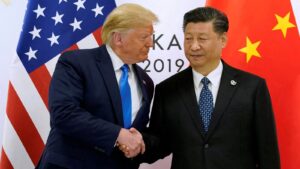|
Getting your Trinity Audio player ready...
|
With an increasing focus on compliance, financial institutions are now turning their attention to monitoring staff video calls for potential rule-breaking. Concerns have arisen that regulatory bodies may soon expand their scrutiny to include video calls, in addition to existing efforts to monitor text messages and emails for compliance breaches.
The ongoing sector-wide crackdown, led by the U.S. Securities and Exchange Commission (SEC), has primarily concentrated on business-related text messages sent over unauthorized platforms, such as WhatsApp. These messages often went untracked and unrecorded during the COVID-19 lockdowns, when a significant portion of employees were working remotely.
While the SEC has not officially commented on the matter, informed sources have expressed concerns that the SEC may extend its requirements to include video calls as well as similar forms of communication.
To address this potential regulatory shift, financial firms are engaging technology specialists, law firms, and risk consultants to ensure that video calls are properly monitored and retained. This is essential to meet record-keeping requirements and mitigate the risk of video calls being used to share non-public information illicitly.
This move coincides with increased efforts by U.S. and UK regulators to enhance protections for individual investors who are increasingly investing in financial markets. This heightened focus on regulatory compliance comes as the “meme stock” phenomenon continues to shape the investment landscape.
Brad Levy, CEO of Symphony, a market infrastructure and technology firm serving clients like JP Morgan and Goldman Sachs, commented on the situation, saying, “I don’t think we have a clue yet of how to incorporate video into a highly regulated work environment.”
Currently, video calls are considered proxies for face-to-face meetings and thus have little or no formal record-keeping obligations. However, experts like Matthew Nunan, a partner at law firm Gibson, Dunn & Crutcher, suggest that regulators are likely to start evaluating video calls for potential compliance failures in the near future.
Sarah Pritchard, executive director for markets at Britain’s Financial Conduct Authority, emphasized their focus on preventing market abuse and the mechanisms that facilitate such activities during a recent annual meeting.
In practice, those deliberately sharing sensitive information often resort to arranging in-person meetings without using workplace devices. However, historical investigations have revealed instances of misconduct through work-related email and chatrooms, prompting firms to evaluate potential breaches occurring during video calls, which have become standard communication tools for thousands of finance workers.
Claire Garrett, head of the financial institutions practice at Marsh, stressed the importance of adapting to the rapidly evolving work environment, saying, “The way we work has evolved hugely over a very short period of time, and firms need to make sure they are absolutely up to speed with the new exposures this brings.”
In response to these regulatory challenges, some global banks have already begun recording Zoom calls, with one bank recording specific staff members’ calls, including traders, while another records all Zoom calls for future review.
While HSBC has blocked staff from sending texts using their work phones, it remains unclear whether the bank is also recording and archiving video calls with clients.
The U.S. Financial Industry Regulatory Authority (FINRA), which oversees more than 624,000 U.S. broker-dealers, obliges certain firms to comply with the ‘FINRA Taping Rule 3170,’ designed to prevent improper practices in the sale or marketing of financial products. This rule mandates the recording of telephone conversations between registered persons and customers for at least three years, with quarterly activity reports submitted to the regulator.
Experts suggest that the widespread nature of the SEC’s enforcement has surprised the industry. However, the line drawn by FINRA’s taping rule may only be redrawn if regulators or Congress take additional action to expand its scope.
Video calls pose unique compliance risks, and the technology required to efficiently screen video calls is not yet widely used. Employees could potentially share non-public information visually, which audio recordings would not capture.
Furthermore, most video call platforms offer chat functions and emoji-style reactions that could be used to communicate without triggering surveillance applications. Experts anticipate that regulatory reach will expand as technology evolves.
The SEC has already imposed over $2 billion in fines for communication compliance violations and is nearing a settlement in a similar extensive probe into breaches among investment advisors. This heightened focus on communication compliance is expected to generate a wealth of data, which could lead to further investigations in the future.
The industry is closely watching how regulatory bodies will adapt to these new challenges and what measures financial institutions will take to ensure compliance in video calls.



